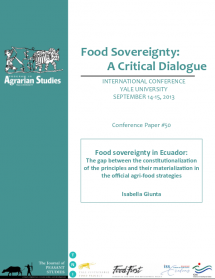Ideas into movement
Boost TNI's work
50 years. Hundreds of social struggles. Countless ideas turned into movement.
Support us as we celebrate our 50th anniversary in 2024.

What is the impact of collective actions for the institutionalization of the principles of food sovereignty in Ecuador?

The paper critically assesses the impact of collective actions for the institutionalization of the principles of food sovereignty in Ecuador, including an analysis of the gap between the formal and material constitution of the official strategies.
The Ecuadorian Constitution (2008) declares food sovereignty as a strategic goal and governmental obligation, institutionalizing – although partially- the proposal put forward since 1996 by the international peasant movement La Vía Campesina. It would have been impossible to achieve this goal without the anti-neoliberal struggles and alternative practices carried out by social organizations in the last decades. Specifically, it's conceivable a central role played by the federations “FENOCIN”, “CONFEUNASSC”, “CNC-Eloy Alfaro” and, then, “FENACLE” (all affiliated to La Vía Campesina), that since the end of the 90s began to articulate themselves and to place food sovereignty as a priority of their individual and common political agendas.
As other social actors, these federations participated actively in the constituent process. At the conclusion, the balance is positive: the new Constitution includes much of the proposals claimed, and the issue of food sovereignty expands from the circumscribed battlefields of some social organizations to become a ground of dispute for the whole Ecuadorian society. The paper, based on preliminary results of a field research conducted between 2012 and beginning of 2013, describes this process and reflects upon why, five years later, the "Agrarian Revolution" is evaluated as weak, also by the governmental sector, although it's a component of the Revolución Ciudadana promoted by the "progressive" government of Rafael Correa.
Isabella Giunta is a PhD candidate, School of Doctorate in Knowledge and Innovation for Development-A G. Frank, Department of Political and Social Sciences, University of Calabria (Italy) A graduate in Social Anthropology, Ms. Giunta, lived for more than ten years in Ecuador working in initiatives of cooperation and research, conducted mainly with social organizations. She performs a comparative research, between Ecuador and Italy, on the collective actions of organizations linked to La Vía Campesina.
Food Sovereignty: a critical dialogue, 14 - 15 September, New Haven.